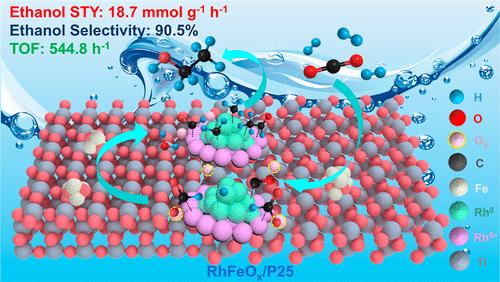在 RhFeOx/P25 上构建活性 Rh-TiOx 表面间隙,实现 CO2 与乙醇的高效氢化反应
IF 13.1
1区 化学
Q1 CHEMISTRY, PHYSICAL
引用次数: 0
摘要
二氧化碳加氢制乙醇是利用二氧化碳生产高附加值化学品的高效工艺。然而,CO2 加氢制乙醇是一个复杂的反应,需要催化剂高效活化 CO2 并精确调节 C-C 偶联,以同时获得较高的乙醇选择性。在此,我们报告了在不同晶相组成(锐钛型、金红石型和 P25 型)的 TiO2 上支撑的 RhFeOx 催化剂的合成,并将其应用于二氧化碳加氢制乙醇的选择性反应。RhFeOx/P25 催化剂在 P25 载体上的 Rh 纳米粒子高度分散,锐钛矿/金红石交界处有大量的 Rh0-Rhδ+-OV-Ti3+(OV:氧空位)界面位点。优化后的 RhFeOx/P25 催化剂乙醇时空产率高达 18.7 mmol gcat-1 h-1,Rh 转化频率高达 544.8 h-1,乙醇选择性为 90.5%。通过各种原位和原位表征以及 H2/D2 交换和 C2H4 脉冲加氢实验进行的深入研究表明,Rh0-Rhδ+-Ov-Ti3+ 界面位点在二氧化碳转化为乙醇的过程中发挥了关键作用。表面的 Rh0 位点促进了 CO2 的活化和氢化,而 Rh0-Rhδ+-Ov-Ti3+ 界面位点则促进了 C-C 偶联生成乙醇。高性能的 RhFeOx/P25 催化剂也为通过 CO2 加氢高效合成乙醇提供了一条极具吸引力的途径。本文章由计算机程序翻译,如有差异,请以英文原文为准。

Construction of Active Rh–TiOx Interfacial Sites on RhFeOx/P25 for Highly Efficient Hydrogenation of CO2 to Ethanol
Hydrogenation of CO2 to ethanol is an efficient process for the utilization of CO2 along with the production of value-added chemicals. However, CO2 hydrogenation to ethanol is a complicated reaction, requiring the catalyst to activate CO2 efficiently and accurately regulate the C–C coupling to achieve a high ethanol selectivity simultaneously. Herein, we report the synthesis of RhFeOx catalysts supported on TiO2 with different crystal phase compositions (anatase, rutile, and P25), which were applied for the selective CO2 hydrogenation to ethanol. The RhFeOx/P25 catalyst presented a high dispersion of Rh nanoparticles on the P25 support with abundant Rh0–Rhδ+–OV–Ti3+ (OV: oxygen vacancy) interfacial sites over the anatase/rutile junction. The optimized RhFeOx/P25 catalyst exhibited a high ethanol space–time yield of 18.7 mmol gcat–1 h–1 and a high Rh turnover frequency of 544.8 h–1 with 90.5% ethanol selectivity. An in-depth investigation via various ex situ and in situ characterizations as well as H2/D2 exchange and C2H4 pulse hydrogenation experiments demonstrated that the Rh0–Rhδ+–Ov–Ti3+ interfacial sites played a crucial role in the conversion of CO2 to ethanol. The surface Rh0 sites facilitated the CO2 activation and hydrogenation, while the Rh0–Rhδ+–Ov–Ti3+ interfacial sites boosted the C–C coupling to produce ethanol. The high-performance RhFeOx/P25 catalyst also provides an attractive route for highly efficient ethanol synthesis via CO2 hydrogenation.
求助全文
通过发布文献求助,成功后即可免费获取论文全文。
去求助
来源期刊

ACS Catalysis
CHEMISTRY, PHYSICAL-
CiteScore
20.80
自引率
6.20%
发文量
1253
审稿时长
1.5 months
期刊介绍:
ACS Catalysis is an esteemed journal that publishes original research in the fields of heterogeneous catalysis, molecular catalysis, and biocatalysis. It offers broad coverage across diverse areas such as life sciences, organometallics and synthesis, photochemistry and electrochemistry, drug discovery and synthesis, materials science, environmental protection, polymer discovery and synthesis, and energy and fuels.
The scope of the journal is to showcase innovative work in various aspects of catalysis. This includes new reactions and novel synthetic approaches utilizing known catalysts, the discovery or modification of new catalysts, elucidation of catalytic mechanisms through cutting-edge investigations, practical enhancements of existing processes, as well as conceptual advances in the field. Contributions to ACS Catalysis can encompass both experimental and theoretical research focused on catalytic molecules, macromolecules, and materials that exhibit catalytic turnover.
 求助内容:
求助内容: 应助结果提醒方式:
应助结果提醒方式:


